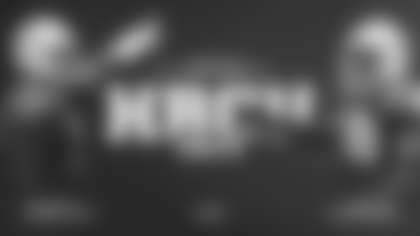INDIANAPOLIS –Raymond Berry certainly knows a thing or two about catching passes for the Horseshoe.
Berry, one of the greatest players to ever play for the Colts franchise, won three NFL receiving titles as a Hall of Fame wide receiver with the Baltimore Colts in 1957, 1959 and 1960.
And while the game and certainly changed quite a bit since he last laced them up, Berry said thriving in today's game as a receiver takes many of the same traits he utilized during his playing days: precision route running, a keen knowledge of the game and your opponents and old-fashioned hard work.
With Indianapolis Colts wide receiver T.Y. Hilton winning the 2016 NFL receiving title, Berry said it's obvious that this most recent in a long line of great Colts receivers is utilizing all of those great traits, and more, in order to be the best in the league – especially considering Hilton's lack of size at 5 foot 9.
"I think that in itself is one heck of an accomplishment," Berry told Colts.com's Matt Taylor and Kevin Bowen in a phone interview this week. "I was 6 foot 2 and I had long arms and I could jump. I was a big target. And T.Y. has done his as a much smaller bull's-eye for the passer to hit. So he must be doing a heck of a job getting open. And that tells me that he is at the top of his game."
Berry brought much more to the position than size and jumping ability, however.
Like Hilton, he worked tirelessly with his quarterback, fellow Pro Football Hall of Famer Johnny Unitas, before, during and after practices to ensure their timing routes were down perfectly.
Then, Berry made sure he spent plenty of time in the film room preparing for his upcoming opposing defenses and defensive backs, trying to gain an edge and learn which moves would work – and which ones likely wouldn't.
Berry said he doesn't necessarily consider his approach to the game any better than all the other great receivers in league history. As times have changed – and as the NFL game has evolved into a much more pass-friendly league – Berry said it's up to each individual player to figure out what can make them great.
On the field, especially during games, Berry said one reason in particular that he was able to thrive was an understanding of in-game adjustments he could make to get open – and having a quarterback who had the freedom to change things up and get the ball his way.
"I think one of the biggest factors in our relationship with quarterback-receiver – (the) Unitas-to-Berry combination – was the fact that Johnny Unitas was in charge of calling the plays, and so I would come back to the huddle and I had something I could get open off, as the huddle was forming, I would just tell him what I could do, and our understanding was I'm feeding the information; he can use it if he wants to," Berry said. "And so that was a way to capitalize on an opportunity that was there, and he usually called what I suggested, because he knew I knew what I was talking about."
Nowadays, most NFL playcalling – with in-game communication the norm from the sidelines to the quarterbacks on the field – is dictated by specific coaches, and not by the players.
Berry – who became a highly successful coach after his playing days were over, leading the New England Patriots to an appearance in Super Bowl XX – said current offensive players, particularly receivers, can take advantage of many changes in officiating from when he played. Offensive lines, Berry said, can get away with much more physicality and contact these days, while defensive backs aren't able to get in the receivers' way very much down the field anymore.
"I think guys today, if they pass blocked in the time that I played, they'd be flagged for holding. They liberalize the ability of the offensive linemen to give the quarterback more time to throw by letting them use their hands and arms a whole lot more in pass protection," Berry said. "I think the pass defense, in the years that I played, they were able to do a whole lot of things to you that they can't do these days. I think that you just had to get used to breaking free from guys trying to hold you, and they didn't really call a whole lot of stuff then. I think today's game, I think they're much more conscious of throwing the flag if they have interference down the field."
But none of those factors should take away from Hilton's accomplishments, Berry said, in large part because of the evolution of complex zone defenses that wide receivers must face in today's game.
"I know in the days that I played, it was 90 percent man-to-man, and I think today they have a whole lot of zone defenses," he said. "And I know in the days that I played, you had to run a pass route that was a good enough fake to get open, and I think the game has changed a whole lot in that zone defenses dominate today – that's my impression, anyway."
Berry also discussed in detail some of his best memories of his playing days with the Colts, including:
On how he was able to be so productive and lead the league in receiving:
"I think, in just looking back at my own experience, we had a great defense that got us the ball all of the time. We had a real balanced offense … we had a strong running game, and Johnny Unitas had plenty of time to throw. And all of those things are great background for a receiver to have maximum production."On how he was able to develop such a good chemistry with Johnny Unitas:
"Well, you know, when I came into the league, there was a veteran receiver, and he really was an example of working with the quarterback. And I know that he got me off on the right foot as far as being able to spend a lot of time with Unitas throwing individual timing routes. Our organization and practice in those days was such that when we came off the practice field, we didn't have to go into the weight room or do other things of that nature; we were able to stay out on the practice field on our own and work on timing individual routes. And that was the No. 1 factor in developing a feel and a timing and a relationship with Johnny Unitas, is that the coaches allowed us to spend as much time as we wanted to working on our own."On why he decided to get into coaching after retiring as a player:
"My dad was a Texas high school football coach, so I grew up around coaching. And whenever I retired as a player, Tom Landry was the head coach of the Dallas Cowboys at that time, and he called me immediately and offered me a coaching job on the Dallas Cowboys' staff, coaching Bob Hayes and Rentzel. And the opportunity to coach was there immediately, and so I didn't have anything else to do, so I took it."On why the 1959 NFL Championship game against the New York Giants is considered the greatest game ever played:
"I think the game had one dominating characteristic, and the first thing was it was the two dominant defenses in the National Football League were matched up against each other. Then offensively, we had led the league in offense; the Giants were just an average team on offense, so we went into the game with an edge. But I don't think anybody really realized it. But there you had Tom Landry coaching their defense, and Vince Lombardi coaching their offense, so Weeb Eubank was in a tremendous matchup with coaching, as you could understand. And the dominant force in that particular championship game when it went into overtime for the first time in NFL history, you know, was Johnny Unitas. He was the difference in the game. He had tremendous number of completions and a high percentage rate of completed passes he was throwing. And we also had a very balanced offense; we could run the ball very effectively, so we put the strongest type of offensive weapon you can on the field, and that's total balance. And we were able to run and throw – and we had the greatest quarterback, arguably, of all-time. So we had a great chance to win the game … and then it had to go into overtime to do that."On why Unitas threw to him so much in that championship game:
"It was a big day for me, no question about that. I asked Johnny Unitas one time, I said, 'Why did you throw to me so much during that game?' He said, 'Well, I figured you'd catch it.'"















